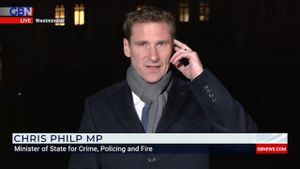Polling data for the upcoming German Federal Election scheduled for February 23, 2025, indicates significant shifts within the party ranks, with CDU/CSU maintaining its lead over the AfD and SPD, according to recent surveys.
According to data released by INSA on January 30, 2025, the CDU/CSU, which currently enjoys support from 29% of voters, is significantly ahead of its closest competitor, the AfD, which sits at 22%. The SPD has fallen to 17%, highlighting the continuing decline of the traditional parties within the German political spectrum.
The results of the survey show shifts compared to the previous polling on January 27, where the CDU/CSU garnered 30%. This reflects a slight drop of one percentage point, whereas the SPD has gained 1.5 percentage points since its last poll, indicating changing sentiments among the electorate.
One of the most concerning results for the current coalition involves the Free Democratic Party (FDP), which has struggled to break past the 5% threshold necessary for parliamentary representation, currently polling at 4%. This trend raises significant questions about the future of the ruling coalition, often referred to as the “traffic light coalition” made up of the SPD, Greens, and FDP.
Election analysts note these shifts may lead to more drastic outcomes as the FDP continues to grapple with low support. A coalition including the CDU/CSU and AfD has been categorically rejected by current CDU leadership, leaving them exploring alternative coalitions potentially comprising SPD or the Greens, either of which would fall short of majority status should the FDP fail to represent.
The total seat count for the Bundestag is at least 630, with the proportional representation system leading to complex coalition formations. Recent polling indicates the CDU/CSU could rekindle past allegiances during its time of majority rule. If these trends continue, there might be coalition discussions revolving around the CDU/CSU's connections with the SPD or even the Greens, enabling them to secure over 50% of seats.
On the other hand, the revolutionary political climate welcomes BSW (Bündnis Sahra Wagenknecht), which has carved out its position on the political map with 6% of voter support, marking it as a potential wildcard entity.
The polling data demonstrates how the political tide has shifted since the days following the 2021 Federal Elections when the SPD temporarily held the lead. Unexpected factors such as public sentiment against current leadership, economic headwinds, and external pressures from the AfD have helped the opposition grow stronger.
Chancellor Olaf Scholz, representing the SPD, has faced increased scrutiny. Following the failure of the trust vote over the weekend marking the end of the traffic light coalition as it exists, citizens may be faced with having to head to the polls earlier than anticipated. Living up to this changing political environment requires the ruling parties to navigate their strategies carefully, examining their positioning and appealing to the electorate.
Coalition possibilities remain broader than before, necessitating collaboration across the aisle as mid-election aligns strengthen. The evident hope among CDU/CSU members to form majorities with either SPD or Greens strains party loyalties and traditional alignments.
Regardless of SDP's new ground throughout and maintaining past alliances, the changing sentiments signal what could potentially be uncharted territory for Germany's political future. With the next elections approaching, this data signals wide-ranging repercussions, as voters ponder whom to trust with the future of the country.
History has shown voters can easily shift priorities, and those involved must be prepared to embrace new coalitions or risk losing ground at these pivotal moments. Predicting accurate polling outcomes, especially amid rapidly shifting public opinion toward the opposing parties, remains challenging yet imperative.
One thing’s for certain: the stakes are high as the nation moves toward elections, with it all on the line for the parties involved.



